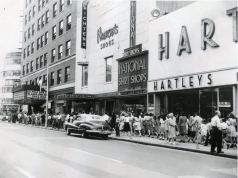With earthquakes shaking the Caribbean, including one of the largest in the region’s history on Tuesday, Puerto Rican organizations and artists came together this week at Casabe House in New York City’s El Barrio to raise funds for Puerto Rico.
The event was hosted by Comité Boricua En La Diáspora, an activist group based in East Harlem, formed in 2016 in reaction to the passing of “Promesa,” a U.S. bill addressing the financial management of the island. The organization describes itself as abolitionist in nature with the goal of dismantling the current system and replacing it with something entirely new.
“We center our narratives around Puerto Rico, but the reality [is] that we are an organization from the diaspora,” said member Andres Rodriguez. “We extend the solidarity to a lot of other struggles … Black liberation, Palestinian liberation, trans rights, LGTBQI+ … and trans liberation,” added member Iris Sipini.
Earthquakes in late December and early January hit the island hard. Damage to government structures was calculated in the hundreds of millions and financial losses came to around $3.1 billion. The fundraiser follows news of unused emergency aid supplies from Hurricane Maria surfacing in a warehouse in Puerto Rico. Two officials, Housing Secretary Fernando Gil-Enseñat and Department of Family Secretary Glorimar Andújar, were fired over the incident. The Puerto Rican governor, Ricardo Rosselló, is also clinging to power amid an impeachment threat.
The participating artists contributed work ranging from photography to paintings to crafts and T-shirts, with proceeds going directly to those affected. Danielle Dejesus, a 32-year-old Bushwick-born Yale student studying painting and printmaking, donated some enamel pins depicting Puerto Rican cultural icons.
“I do a lot of political art … around Puerto Rican’s colonial struggle,” she said. “But I also make work about being gentrified and the gentrification in Bushwick.”
The event was one of many small-scale fundraising efforts that have taken place in New York over the past week.
Carla Minet, executive director of the Center for Investigative Journalism in Puerto Rico, doesn’t find this surprising. “The diaspora has been very active, you know, in terms of responding to the last disasters in Puerto Rico. Hurricane Maria, Hurricane Irma and now because of the earthquake,” she said. “That’s part of the cultural identity of Puerto Ricans. That even though they are in the U.S. they feel so attached and so compromised with what happens on the island. That’s a very unique cultural trait of Puerto Ricans.”
Some members of Comité Boricua En La Diáspora have family in the south of Puerto Rico who were directly affected by the recent natural disasters. Sipini said parts of the southern region, particularly the archipelagos, are mostly ignored by the government and social services.
“I want to reiterate that when we talk about loss it’s not about financial loss, you know … It’s more about the loss of life, the loss of human dignity and the loss of homes,” she said.
Sipini emphasized that the wealth gap between Puerto Ricans in the U.S. and those on the island made it imperative that the community here do its best to support those who are not as well off.
Rodriguez also noted the importance of hosting this event in a historic community center. Casabe House, the brainchild of Puerto Rican Ernesto Martinez, is a residence for the elderly. It was built in 1981 to serve the elderly, not only with affordable rent, but also with an on-site social worker who deals with Medicaid, social security and food stamps.
“Right now, we are sitting on indigenous land. We always want to acknowledge that because we are in the same boat,” said Sipini. “If we and the people in Puerto Rico don’t start taking certain actions of self-defense as communities, as a nation, we are going to encounter the same situation in 10 years that the Lenni Lenape and other native Americans here are encountering.”
“They were displaced from their lands. Their lands were robbed.”
Sipini was referring to the indigenous people, known as the Lenape, who were the original inhabitants of Manhattan before selling it to the Dutch in 1626, marking the beginning of their removal from their homeland.
The proceeds from the event will be disbursed through Brigada Solidaria del Oeste, a self-managed community initiative comprised of individuals from different organizations working to empower and grow grassroots efforts in Puerto Rico, and EspicyNipples, a trans-feminist network dedicated to telling the stories of LGBTQ, women, POC, immigrants, single mothers and indigenous people. Both organizations are active on the ground in Puerto Rico and have a history of working with Comité Boricua En La Diáspora.
“What we want is to raise as much as we can to send it back to our people,” said Sipini. “To put it into the hands of the people that are actually doing something — the grassroots organizations. The government is not doing it. They’re stealing money, they’re stealing funds and even water. They’re hiding food and water from our people.”
Sipini added that this struggle raises consciousness in people while helping them meet their everyday needs. She hopes her organization’s work will inspire Puerto Ricans to rise from the colonial mentality.
“We don’t need anybody but ourselves,” she said. “We don’t need to beg for what is ours.”
































